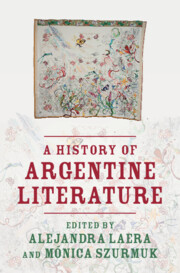Book contents
- A History of Argentine Literature
- A History of Argentine Literature
- Copyright page
- Contents
- Figures
- Contributors
- Editors’ Acknowledgments
- Introduction
- Part I Literary Dates
- Part II Critical Inroads
- Part III Literary Names
- Chapter 21 Sarmiento: Politics, Culture, and Spectacle
- Chapter 22 The Mansilla Siblings: A Story in Syntony
- Chapter 23 Martín Fierro: Subaltern Voices
- Chapter 24 Borges and Argentine Literature: A Detour around the World
- Chapter 25 Roberto Arlt
- Chapter 26 The Ocampo Sisters
- Chapter 27 Alfonsina Storni and Alejandra Pizarnik
- Chapter 28 Displacement and Transfer in Julio Cortázar’s Todos los fuegos el fuego
- Chapter 29 Manuel Puig’s Circuit Bending: Literary Listening against Surveillance
- Chapter 30 Operation Massacre: Dangerous Journalism
- Chapter 31 The Politics of the Poem: From Gelman to Perlongher
- Chapter 32 Scenes from Postmodern Life: Literary Interventions in the Public Sphere
- Chapter 33 Griselda Gambaro and Beyond: A “Dermography” of Contemporary Women’s Theater and Performance
- Chapter 34 César Aira and the Art of Invention
- Index
- References
Chapter 25 - Roberto Arlt
from Part III - Literary Names
Published online by Cambridge University Press: 09 May 2024
- A History of Argentine Literature
- A History of Argentine Literature
- Copyright page
- Contents
- Figures
- Contributors
- Editors’ Acknowledgments
- Introduction
- Part I Literary Dates
- Part II Critical Inroads
- Part III Literary Names
- Chapter 21 Sarmiento: Politics, Culture, and Spectacle
- Chapter 22 The Mansilla Siblings: A Story in Syntony
- Chapter 23 Martín Fierro: Subaltern Voices
- Chapter 24 Borges and Argentine Literature: A Detour around the World
- Chapter 25 Roberto Arlt
- Chapter 26 The Ocampo Sisters
- Chapter 27 Alfonsina Storni and Alejandra Pizarnik
- Chapter 28 Displacement and Transfer in Julio Cortázar’s Todos los fuegos el fuego
- Chapter 29 Manuel Puig’s Circuit Bending: Literary Listening against Surveillance
- Chapter 30 Operation Massacre: Dangerous Journalism
- Chapter 31 The Politics of the Poem: From Gelman to Perlongher
- Chapter 32 Scenes from Postmodern Life: Literary Interventions in the Public Sphere
- Chapter 33 Griselda Gambaro and Beyond: A “Dermography” of Contemporary Women’s Theater and Performance
- Chapter 34 César Aira and the Art of Invention
- Index
- References
Summary
The chapter argues that, with the publication of Los siete locos (The Seven Madmen) in 1929, Roberto Arlt produced the first major Argentine novel whose ideological topics, ways of representation, systems of characters, and spatial inventions, far from finding their place among the national literary traditions, establish a dialogue with the great novels of metropolitan modernity of the time: James Joyce’s Ulysses (1922), John Dos Passos’ Manhattan Transfer (1925), and Alfred Döblin’s Berlin Alexanderplatz (1928). The modern city, the cosmopolitan city of urban mixture and modernization, is the grand stage for the aesthetic, ideological, cultural, and social conflict in Arlt’s literature. In this sense, as a writer, journalist, and playwright, Arlt is the one who best expresses the disruption of an order and the instability implied by the impact of modernization on Argentine culture in the early twentieth century.
- Type
- Chapter
- Information
- A History of Argentine Literature , pp. 390 - 403Publisher: Cambridge University PressPrint publication year: 2024

